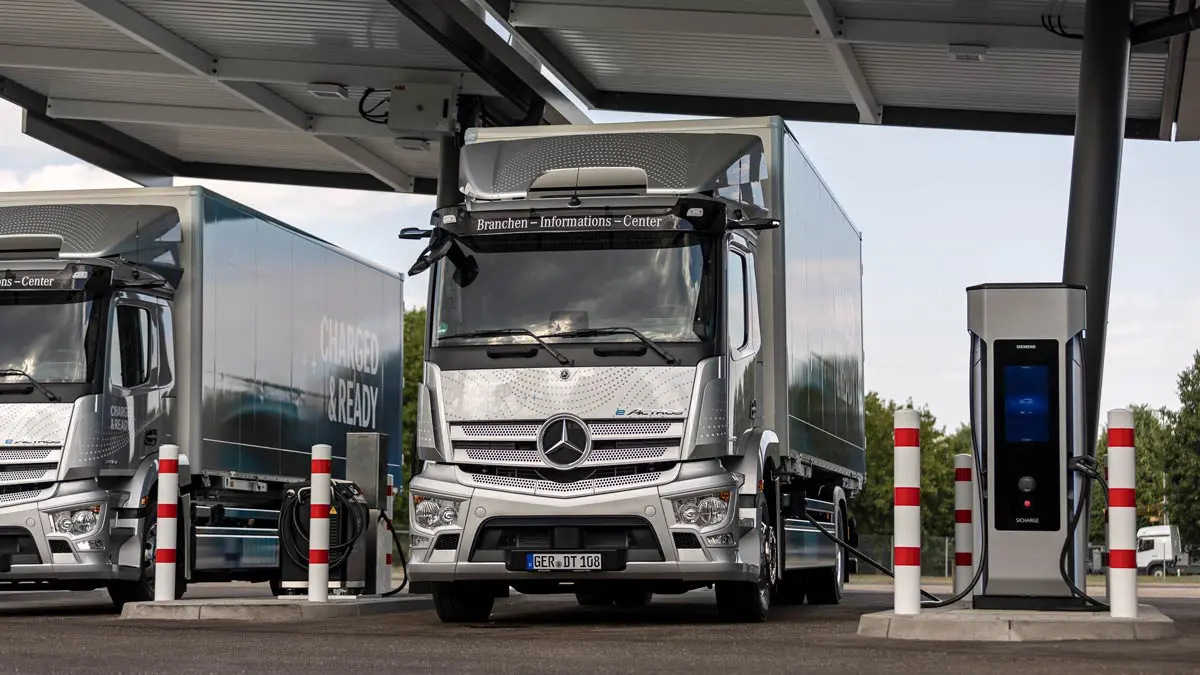The transition to electrification in heavy transport is becoming a reality, with the growing investment in more powerful charging solutions serving as clear evidence.
To promote and facilitate the adoption of electric trucks, an increasing number of companies are investing in the Megawatt Charging System (MCS).
But in what context is this happening?
It’s occurring against the backdrop where road transport accounts for more than a quarter of the greenhouse gas emissions generated by road transport in the European Union (EU).
This makes electrifying the sector crucial.
In light of this, Mobility Portal highlights the most promising megawatt charging projects announced for Europe.
1. Kempower launches its own MCS charger
At the Nordic EV Summit, where Mobility Portal Europe was present, the company explained that they have invested in their facilities to build the high-power systems of the future.
The aim of this innovation is to allow drivers to recharge their eTrucks during mandatory rest periods at optimal times.
This next-generation solution for heavy duty electric vehicles (HDEVs), with power levels exceeding one megawatt, is designed to tackle the challenges of electrifying heavy vehicles and meeting the EU’s decarbonisation goals and the Alternative Fuels Infrastructure Regulation (AFIR).
Building on its leading technology, the first version of Kempower’s Megawatt charging solution offers a maximum output of 1,500 amperes (A), 1.2 megawatts, and a Kempower megasatellite.
This system ensures maximum compatibility with high-power CCS or MCS plugs, and any unused energy can be distributed across multiple outlets through dynamic power sharing.
Kempower customers can upgrade their existing systems to MCS by combining two 600-kilowatt power units, optimising space and facilitating truck charging.
This system is now available for orders in Europe, with deliveries starting in the first quarter of this year.
2. Power Electronics unveils its most powerful charger to date
Power Electronics introduces the MCS, its most powerful charger yet.
This new solution promises to charge batteries from 10% to 80% in approximately 30 minutes, thanks to its capacity of 1,440 kW (1,500 A, 1,000 V).
Not only will this reduce charging times by around 90%, but it will also enable road transport professionals to charge their trucks in a time similar to the mandatory rest period.
It’s worth noting that in 2023 alone, the company completed over 2,000 projects worldwide, contributing to the electrification of routes and accelerating the transition from fossil fuels to renewables.
3. Iberdrola | bp pulse launches the first MCS for heavy vehicles in Southern Europe
With a power output of over 1,000 kilowatts, the new charger has been operational since July and allows up to 80% of a truck’s battery to be recharged in just 30 minutes.
Iberdrola | bp pulse marks a milestone with the installation of the first MCS for heavy electric vehicles in Southern Europe.
This achievement, in collaboration with Power Electronics, is located in Murcia, at the logistics base of Disfrimur, a company specialising in freight transport and logistics.
The charger boasts a power output of over 1,000 kilowatts.
The development of this infrastructure is crucial to supporting the widespread transition to electric truck fleets (eHGVs) and reducing greenhouse gas emissions in the road transport sector.
4. Stäubli announces its Megawatt Charging System with up to 4.5 MW
Stäubli’s MCS has been designed according to CharIN working group specifications, with a strong focus on durability and ease of use.
The use of a liquid-cooled cable enables faster charging times and greater flexibility, making it a crucial component in sustainable transport.
Offering up to 4.5 megawatts (MW) of charging power, with a nominal current of up to 3,000 A and 1,500 V, the Stäubli MCS effectively addresses the challenges associated with charging commercial vehicles.
Stäubli’s MCS includes both the charging connector with a cable for the infrastructure side and the vehicle inlet.
Notably, the official launch is scheduled to coincide with the progress of standardisation.
5. ABB Group unveils the MCS Charger
In March, ABB Group and MAN Truck & Bus celebrated the launch of the device at an event attended by the Minister-President of Bavaria, Markus Söder.
During the ceremony, an eTruck was charged with over 700 kilowatts and 1,000 amperes.
It’s noteworthy that ABB will install Germany’s first megawatt charging points at MAN’s development centre in Munich.
With the completion of this standard, charging capacities exceeding one megawatt will be possible, resulting in improved charging times.
The international standardisation process for the equipment is expected to be completed this year.
During the presentation, Alexander Vlaskamp, CEO of MAN Truck & Bus, stated: “The goal is to have 30,000 MCS charging points in Europe by 2030, with around 4,000 of them in Germany.”
The new prototype of Siemens’ MCS recently delivered a successful one megawatt charge for the first time during testing.
Other announcements highlighted by Mobility Portal:
Siemens reveals a prototype MCS
The Sicharge MCS consists of several Sicharge UC150 control cabinets, a switching matrix, and a special MCS dispenser.
The central element of the MCS is the switching matrix, which aggregates the output power of the charging stations and directs it to the MCS dispenser, based on demand.
With a charging station delivering around one megawatt of power, the batteries typically used in electric trucks can be charged from 20% to 80% in about 30 minutes.
It has already been tested in collaboration with developers from Mercedes-Benz Trucks and recently charged a prototype of the eActros 600 at their development and testing centre in Wörth am Rhein, Germany.
This was the first time an eActros was charged with one megawatt of power.
However, this has not been officially confirmed.
Autel Energy unveils the Maxicharger MCS
The company is introducing a new heavy-duty charging solution to the European market.
“We will be launching the one-megawatt charger for trucks and buses,” announced Per Jeppson, Vice President of Nordic Sales at Autel, in conversation with Mobility Portal Europe.
The MCS Maxicharger is the latest generation in charging solutions, distinguished by its megawatt-level power and satellite compatibility, ensuring seamless integration with the respective connector.
It’s worth noting that this charger is already available for pre-order in Europe.
In partnership with Hubject, the company will conduct extensive testing to ensure flawless integration of the MaxiCharger with the main charging network platform.
BP Pulse to build an MCS truck station in England
BP Pulse will take over a truck stop at Ashford International Truckstop in Kent, with plans to develop an extensive rapid charging park for electric trucks.
The site will offer space for approximately 20 megawatt chargers, ten 400-kilowatt chargers, and 125 100-kilowatt chargers.
The first MCS infrastructure is expected to connect to the grid by 2026.
Expansion will depend on the availability of electrical connections and the pace of road freight electrification in the UK and Europe, according to the company.
However, it’s worth noting that the potential demand is high, as the location is strategically situated near Dover, the UK’s busiest ferry port, and the Eurotunnel in Folkestone.
Stefan von Dobschuetz, CEO of bp pulse Europe, comments that if the initial CCS charging points are operational before the ultra-fast chargers, they will enable a connection from the UK to BP Pulse’s German charging corridors, which is crucial for building a comprehensive network across Europe.
Kverneland Energi announces a 2 MW charging station
Kverneland Energi is keeping pace with this trend.
At the Nordic EV Summit, the Norwegian-based company announced the development of a charger with an innovative two-megawatt power output.
“This is our first major project in this field,” revealed Torbjørn Kverneland, the company’s Sales Director, in a conversation with Mobility Portal Europe.
It’s important to note that the company works with energy systems for renewable energy production and integrates solar cells, batteries, lightning-type chargers, and software.
Galliker Transport launches the “Mega Charger” from Swiss Designwerk for eTrucks
During the “Innovation Day by Galliker” in Altishofen, Designwerk Technologies AG unveiled its first mega charging station.
This rapid battery charging system, housed in a standard container, is designed to efficiently charge heavy electric trucks.
Additionally, it aims to ease the strain on the power grid during peak charging hours.
In collaboration with pilot customer Galliker Transport AG, Swiss electric mobility specialist Designwerk Technologies AG is bringing future-oriented solutions to the present.
The so-called “Stationary Battery-Backed Mega Charger” (SBC) from Designwerk was officially launched after approximately two years of development.
The charging station had already been awarded “The Smarter E-Award” in the E-Mobility category.
Galliker’s storage and charging solution includes four battery packs with a total capacity of 1,000 kWh, expandable up to a maximum of 2,000 kWh.
Moreover, the station charges during the day using self-generated solar energy.
Milence opens two charging centres for eTrucks in France
Milence, the joint venture between Daimler Truck, TRATON GROUP, and Volvo Group, has expanded its operations to the French market with the completion of the first phase of its charging centre in Heudebouville, located 40 kilometres south of Rouen.
The Heudebouville charging centre will be developed in two distinct phases, with the opening of the site marking the completion of the first phase.
The second phase, expected to be completed by the end of the year, will include additional charging points with MCS technology.
The centre, Milence’s first in the country, is strategically situated in the Agglomeration Seine Eure logistics district.
It is a crucial route for hauliers and heavy vehicle drivers travelling between Paris and other major logistics hubs in Normandy, such as Le Havre (France’s largest container port), Caen, Dieppe, and Rouen.
Additionally, the company has recently announced its second charging centre in the country, which will be located in Perpignan and will also feature MCS technology.
Shell opens megawatt charger for trucks and vessels in Amsterdam
Shell has inaugurated its first self-developed megawatt charger for dual use with both electric trucks and transport vessels at the Energy Transition Campus Amsterdam (ETCA).
The megawatt charger has the capacity of approximately three conventional 350 kW fast chargers, which are currently used for truck charging.
The megawatt charger is connected to ETCA’s own microgrid.
This smart grid allows for integration between energy supply, energy storage, and energy demand. The ETCA microgrid includes 3,600 solar panels on the roofs, stationary battery storage, 119 electric vehicle chargers for cars, a hydrogen electrolyser, and other research equipment.
The MCS is equipped with two separate charging arms.
One rotating arm is dedicated to electric vessels, while the other serves heavy-duty electric trucks and buses.








